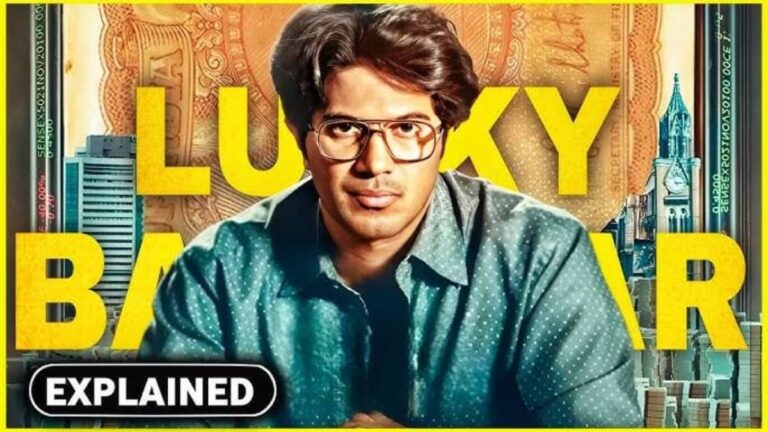Lucky Baskhar, starring Dulquer Salmaan, is a gripping tale of ambition, greed, and redemption. Set in the 1990s, the film follows Baskhar Kumar, a humble bank employee in Mumbai, as he navigates financial struggles, succumbs to the lure of crime, and ultimately seeks redemption.
The film’s finale ties together themes of systemic corruption, personal integrity, and family bonds, leaving viewers with much to ponder.
Major Events in the Finale
The film’s climax centers on Baskhar’s decision to expose a massive banking scam orchestrated by Harsha Mehra, a powerful businessman manipulating stock markets and exploiting banking loopholes.
Baskhar, initially driven by desperation to support his family, partners with smuggler Anthony and dives into illegal activities that bring him wealth and status but also entangle him in a web of corruption.
Baskhar’s moral turning point comes when he uncovers evidence implicating Mehra and corrupt bank executives.
Despite immense pressure to stay silent, Baskhar decides to report the fraud to the Reserve Bank of India. In a suspenseful sequence, he thwarts the CBI officials working for the corrupt bankers by closing his account and triggering an internal investigation.
This act unravels the empire built by Mehra and his associates.
In the closing moments, Baskhar and his family leave India for Boston, having secured an investment visa through previous connections.
This decision symbolizes a fresh start for Baskhar, who has reclaimed his integrity and prioritized his family over wealth and ambition.
Themes and Impact on Future Storylines
The ending of Lucky Baskhar underscores the consequences of greed and the redemptive power of integrity.
Baskhar’s journey from a morally compromised individual to a whistleblower highlights the importance of personal accountability in combating systemic corruption.
His choice to prioritize his family over personal gain serves as a powerful statement about the value of relationships and ethical living.
While the story concludes on a hopeful note, it leaves room for speculation. The fallout of Baskhar’s actions could lead to further consequences for those involved in the scam, hinting at potential follow-ups or spin-offs exploring the wider ramifications of the scandal.
Most-Asked Questions
- What motivates Baskhar’s transformation?
Baskhar’s transformation is driven by his initial desperation to provide for his family. His descent into greed alienates him from his loved ones, prompting a realization that wealth without integrity is hollow. - How does Baskhar’s relationship with his family evolve?
Baskhar’s unethical choices strain his marriage with Sumathi and his relationship with his father. However, his decision to expose the scam and secure a better future for his family leads to reconciliation and a renewed focus on family unity. - What is the significance of the ending?
The conclusion of Lucky Baskhar emphasizes redemption and integrity. By choosing to expose corruption rather than succumb to it, Baskhar reclaims his moral compass and sets a hopeful example for his family.
Lucky Baskhar is both a cautionary tale about the perils of greed and a story of personal redemption.
Its powerful narrative, combined with Dulquer Salmaan’s stellar performance, delivers a thought-provoking commentary on ambition, family, and integrity.
The film’s ending provides closure while leaving enough intrigue for audiences to imagine what might come next.
